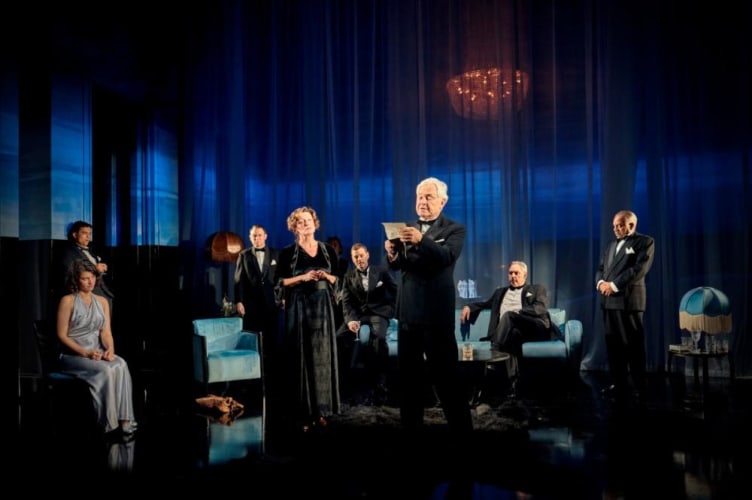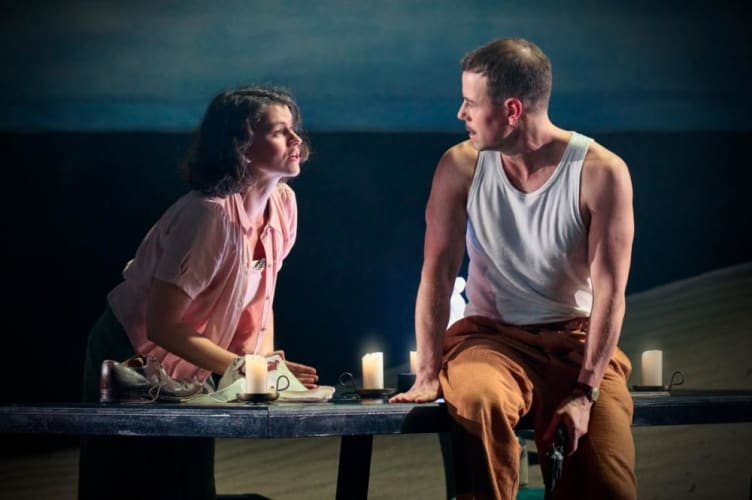Which is the greatest Agatha Christie novel? I imagine many readers would plump for an iconic Poirot story—probably one set in an exotic location—like Murder on the Orient Express (1934) or Death on the Nile (1937). Several Christie scholars, such as John Curran, would opt for Five Little Pigs (1942), a superb cold crime case, and devotees of Miss Marple might favour Murder at the Vicarage (1930) or A Murder Is Announced (1950).
If pushed on the matter, my vote would probably go to And Then There Were None, which has sold over 100 million copies since it was first published in 1939. In addition to having a brilliantly constructed plot, it is also the darkest and most atmospheric of all Christie’s novels.
Lucy Bailey’s slick production preserves the ingenious mechanics of the book, which sees ten strangers (eight guests and two caretakers) being brought to a small, isolated island at the request of the mysterious Mr and Mrs U N Owen. During their first evening together, a record is played which accuses each individual of committing murder, and one by one the unlikely group are dispatched by an unseen psychopath.
To make things even more sinister, each of the deaths—which range from poison to bludgeoning—correspond to a ghoulish minstrel song, “Ten Little Soldiers”, meaning the manner of each killing is foreshadowed.
Baroque plots involving twisted madmen are not uncommon—one thinks, for example, of David Fincher’s Se7en (1995) or the interminable Saw franchise—but I struggle to think of any that rivals the cleverness of And Then There Were None. Overall, the script succeeds in preserving the key aspects of Christie’s plotting, including impressionistic flashbacks which help us to understand the characters’ past misdeeds.
For the most part, the performers give strong performances. Sophie Walter is very engaging as Vera—arguably the play's most relatable character—who mentally disintegrates as she watches her companions being eliminated. Joseph Beattie brings an appropriate level of macho swagger to Phillip, who betrays no guilt about his war crimes, and David Yelland is suitably solemn as Judge Wargrave. Best of all is Katy Stephens as the acerbic Miss Brent, who masks her callousness under a veneer of Christian self-righteousness.
I have greatly admired Lucy Bailey’s work in the past, particularly her revelatory production of The Taming of the Shrew with Lisa Dillon and David Caves. While And Then There Were None is slightly static in the early scenes, it snaps into life once the killing starts, culminating in one of the most harrowing final scenes I have ever seen on stage.
The BBC produced a terrific version of Christie’s novel several years ago, and one of its great virtues was the bleak, hellish ambience it created. While designer Mike Britton is more restricted in what he can accomplish within the confines of a theatre, a sheer curtain is effectively used to organise the stage into indoors and outdoors, past and present. Elizabeth Purnell’s sound design helps to evoke the isolation of the island and the guilty memories which assail the characters’ consciences.
Christie’s most famous play may be The Mousetrap—which is now best known for its longevity (70 years and counting)—but, in my opinion, And Then There Were None is considerably more enjoyable.


